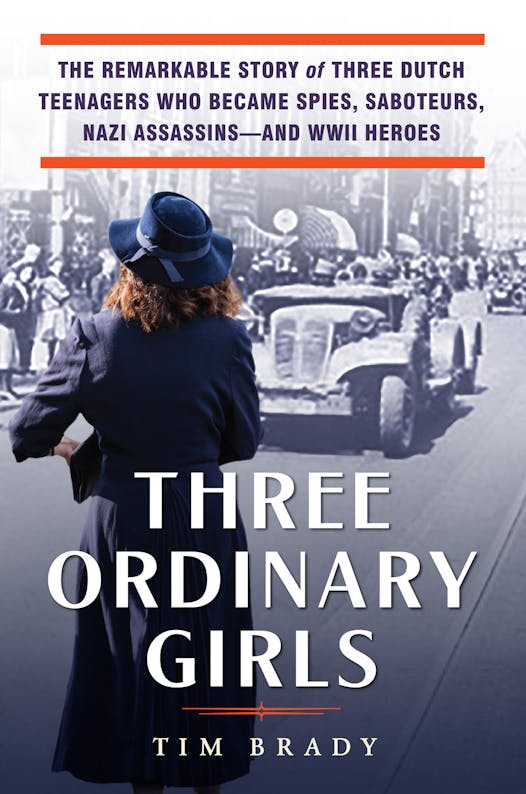
Dear Commons Community,
I just finished reading Three Ordinary Girls – The Remarkable Story of Three Dutch Teenagers Who Became Spies, Saboteurs, NAZI Assassins and WW II Heroes, by Tim Brady.
I confess I knew nothing of the lives of the three heroines, Hannie Schaft, and sisters, Truus and Freddie Oversteegen, whose stories and exploits are well-known in The Netherlands. I found it riveting in its depictions of these teenagers (ages 19, 16, and 14) who join a resistance cell in the Dutch city of Haarlem in 1940. A main theme of the book as stated in the title, is that the three were just “ordinary” young people who came from modest backgrounds. While their initial assignments were acting as messengers and putting up protest posters, they quickly escalated to assassinations of German officers and Dutch traitors. In retelling their own stories, while they realize that their childhoods were taken away from them, Truus and Freddie had no remorse about the murders they committed. While I would like to say that there was a happy ending, Hannie Schaft was caught by the Germans and executed just three weeks before the end of World War II.
![]()
Brady’s book moved me to read another book on the same subject, Seducing and Killing Nazis, by Sophie Poldermans. Both books are consistent in telling the story of the three heroines. I decided to read the second book mainly because it is filled with photos of the girls and others who played a role in their lives.
In sum, I found both books inspirational. I highly recommend them.
Below is a review of Three Ordinary Girls… that appeared in the Star Tribune.
Tony
—————————————————————————
Review: ‘Three Ordinary Girls,’ by Tim Brady
NONFICTION: The true story of three Dutch teenagers who boldly fought the Nazis through subversion and violence.
By John Reinan Star Tribune
Among the deadliest fighters in Nazi-occupied Holland were a trio of schoolgirls barely out of pigtails.
Sisters Freddie and Truus Oversteegen, along with their friend Hannie Schaft, started small: stealing documents, circulating banned publications and passing along messages to underground resistance fighters.
But before long, these sweet young things — ages 14, 16 and 19 when the Nazis invaded in 1940 — had formed a lethal gang that planted bombs and gunned down German soldiers as well as Dutch collaborators.
As fresh-faced teenagers, they were unlikely to be suspected of anti-fascist activities, allowing them to operate under the noses of the Nazis and, if need be, flirt their way out of trouble.
The amazing true story is told by St. Paul author Tim Brady in “Three Ordinary Girls,” an account of the trio forced by war into roles as spies, saboteurs and assassins — heroes who traded their schoolbooks for guns.
The Nazi occupation of countries throughout Europe revealed fault lines in those societies. Who would resist the brutal invaders? Who would collaborate with them? And who would assist the Jews, their fellow citizens marked for ruthless extermination?
Brady’s subjects chose to fight. The Oversteegen sisters were raised by a single mother with fervent socialist and Communist sympathies. Schaft was a law student whose highly protective parents tried to shield their only child from the world’s encroaching evil.
Joining the resistance in their hometown of Haarlem, a city on the fringe of metropolitan Amsterdam, the young women soon distinguished themselves by the bold courage with which they carried out their assignments. In time, they became prolific “liquidators” of Nazi oppressors and the Dutch citizens who assisted the jackbooted thugs.
The girls’ signature tactic in bicycle-dependent Holland was the drive-by shooting on a bike, coolly pedaling away after gunning down their target.
Having seen the atrocities visited on their friends and fellow countrymen by the Nazis, the girls didn’t have any moral qualms about fighting back.
“It was a necessary evil,” Freddie Oversteegen recalled years later. “I felt no pity.” Her sister agreed.
“There was really only one solution,” Truus Oversteegen said. “Shooting.”
Brady paints a compelling picture of the fear, tragedy and paranoia of living in an enemy-occupied land. Heroism and betrayal exist side by side; mistakes are made in the fog of war.
The author builds drama slowly — perhaps too slowly. A prologue might have been a good idea, giving the reader an early taste of the excitement to come.
But ultimately, his book succeeds as a tale of how extraordinary circumstances call forth the unexpected strength of ordinary people.
John Reinan is a Star Tribune reporter.


